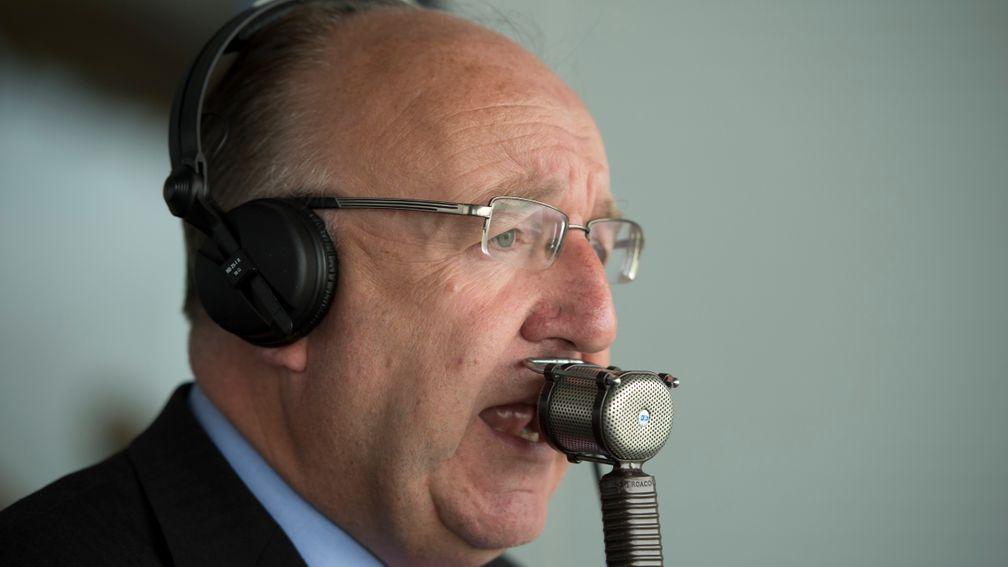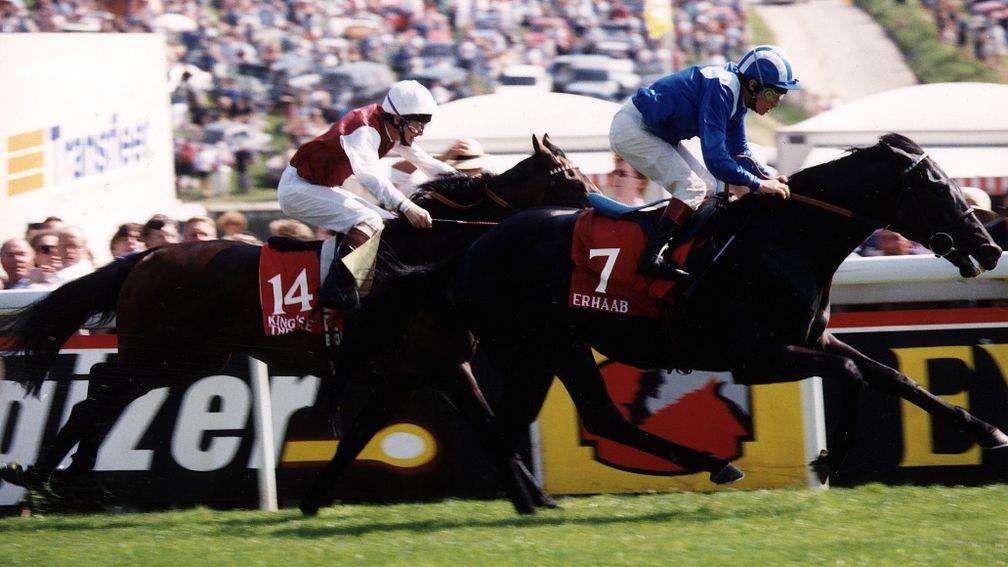- More
Loss of popular BBC broadcaster reflects a sport losing purchase with the public

Among racing correspondents in my lifetime, very few developed as dedicated a following as Cornelius Lysaght, and there was widespread dismay last week when it was revealed his long career as racing’s voice on BBC radio is set to end in April.
All manner of folk, from humble grooms to peers of the realm, could scarcely believe it. How could a man whose instantly recognisable diction made him a bastion of racing coverage be deemed surplus to requirements by the national broadcaster?
Industry insiders congregating at Tattersalls for the December sales in Newmarket were flabbergasted. Those who barely knew him were intimate with his assured oratory; he was a valve inside racing’s beating heart.
The message for the sport was very clear – an esteemed broadcaster had been engulfed by a tide that is sweeping the sport and all who sail with her out to sea. And he is far from alone.
Lysaght, 54, joins the likes of Jim McGrath, his former BBC colleague whose tenure as Hotspur, The Daily Telegraph’s racing correspondent, was abruptly terminated after three decades in 2014. And Alan Lee, racing correspondent at The Times, was not replaced when he died unexpectedly the following year.
There could be no clearer indication that racing is losing its lustre. Its predicament becomes bleaker and bleaker, as was illustrated by a sorry snapshot at last week’s Horserace Writers and Photographers Association awards lunch. With the axe hovering above his head, Lysaght introduced a new award in memory of Lee, a journalistic heavyweight from a newspaper which now accords racing next to no editorial coverage. How times have changed.
Ask a dozen diehards the reasons for this and you will get a dozen different answers. One of them argues that the Derby’s move from the first Wednesday to the first Saturday in June marked the start of the decline. They were obviously not at Epsom in 1994 for the last Wednesday Derby. For this writer, then working for The Times, it was a seminal experience.

Derby day was one of two annual occasions when you were assured of a morning phone call from the sports editor – and just occasionally, from the editor himself. Together with the Grand National, it was seen as a defining sporting occasion. You needed to be on your mettle, and were encouraged to phone in throughout the afternoon with any little snippet you had gleaned.
An hour after the race I came across a light-hearted story of peripheral interest and duly relayed it back to the office. But the top brass had long since tuned out, having watched the coverage on television. “The winning owner didn’t seem particularly excited,” I was told. “Why should we be?”
Taken aback, I stepped out on to the press-room balcony with panoramic views of the racetrack. The Downs seemed almost deserted. There could not have been 20,000 where 200,000 enthralled spectators once stood cheek to cheek. And I remember thinking that perhaps the sports editor had a point.
The idea that returning the Derby to a Wednesday will return the sport to favour is poppycock, as is the idea that it would lead the back pages on Thursday morning. A return to Wednesday would mark a return to sparse crowds on the Downs, and the simple truth is that sporting events of great national importance do not unfold before small crowds.
But there was a broader point to that 1994 Derby. For the fifth time in six years the race was won by a middle-eastern potentate, as it would be in four of the next five renewals. It is not the middle-eastern aspect that is relevant, it is their dominance.
Tennis’s popularity waned during Pete Sampras’s lengthy reign, as did snooker’s during Stephen Hendry’s stranglehold. In sport, cherished for its unpredictability, dominance does not promote public interest. It usually has the opposite effect. Flat racing in Britain has been dominated by a handful of entities for more than three decades.
Dubai’s ruling Maktoum family has won the British owners’ championship in 30 of the last 35 years. The 35 trainers’ titles have been won by just nine individuals, and by constantly piling up one poor race meeting on to another, the authorities have ensured that the big-name riders do not even attempt to win the jockeys’ title because of the physically exhausting nature of the quest.
Jump racing is fast becoming a mirror image. In the last 35 years only six individuals have been champion trainer. Just four riders have won the jockeys’ title over the same period. Racing is losing its capacity to surprise, which was always one of its most alluring qualities.
But there are other influences at play. Racing fared badly in Britain’s social evolution in the closing decades of the last century and the appeal it once had as a quasi-acceptable theatre of skulduggery has significantly diminished.

The Little Rory Mac episode, which provoked a social media storm last week after the horse’s owner boasted of his betting coup, would not previously have raised an eyebrow. A horse with six duck-eggs to its name would routinely justify favouritism in the Stewards’ Cup and nobody batted an eyelid. They were different times with different prevailing attitudes, which is why today’s politicians would not be seen dead in a morning suit on Derby day.
Against that, what passed for standard practice at that time was always a little too close to the bone. When it comes to racing’s fan base, it is all very well adopting one trainer’s attitude to owners – treat them like mushrooms: feed them s*** and keep them in the dark. But you can’t then complain when those owners abandon the sport.
So what can racing do to reverse this growing antipathy? There is no easy solution – if indeed there is a solution at all. Sad to relate, but the sport’s ruling authorities have always been slow to see opportunity. They have been more content to react than be proactive.
In the early 1960s the chance to establish a tote monopoly was essentially spurned by Jockey Club inaction when the issue was debated in parliament. Apparently their lordships were more concerned with securing an ante-post price than a golden opportunity to secure the sport’s finances.
It was the same story when deals involving the relaying of live pictures from racecourses were being cut in the 1980s. Here was a chance to take control of a mechanism that would come to deliver huge income streams – and Racing PLC didn’t want to front up the money.
Now the sport is plagued by welfare concerns and how to deal with the whip. In both instances it is on the back foot. The whip issue has been a bone of contention for the best part of 30 years. Jockeys have long been permitted to breach whip rules while keeping the race. To have disqualified them back then would have been to consign this festering sore to a medical footnote.
But welfare and whip concerns are not the only thorns in racing’s side. Its alliance with the betting industry stemmed largely from politicians insisting down the decades that the two entities should work more closely together. It is supremely ironic that politicians now see gambling, with racing pinned to its coat-tails, as contagiously toxic.
It must also be acknowledged that racing is a sport that has historically punched above its weight in the media. It has always generated coverage beyond the sum of its parts, probably because it was populated by people who ran or owned the country.
Those days are fast becoming a distant memory. The only realistic conclusion is that it will take a super-human effort to turn the ship around and sail it back into port.
This article is available free as a sample. Members can read exclusive interviews, news analysis and comment available from 6pm daily on racingpost.com. Subscribe to Members' Club here
Published on inComment
Last updated
- We know that times are tight - but racecourses really do need to step up and improve outdated weighing rooms
- The budget has heaped even more trouble on racing - and I fear many trainers will now decide the numbers just don't add up
- Why I think Cheltenham Festival handicaps need to change - JP McManus writes exclusively for the Racing Post
- No-one has ever emerged from the womb wearing a trilby - racing's future survival hangs on pursuing a young audience
- Four score and ten just a number to Peter Harris as July Cup triumph shows there's more to the elderly than medical conditions
- We know that times are tight - but racecourses really do need to step up and improve outdated weighing rooms
- The budget has heaped even more trouble on racing - and I fear many trainers will now decide the numbers just don't add up
- Why I think Cheltenham Festival handicaps need to change - JP McManus writes exclusively for the Racing Post
- No-one has ever emerged from the womb wearing a trilby - racing's future survival hangs on pursuing a young audience
- Four score and ten just a number to Peter Harris as July Cup triumph shows there's more to the elderly than medical conditions